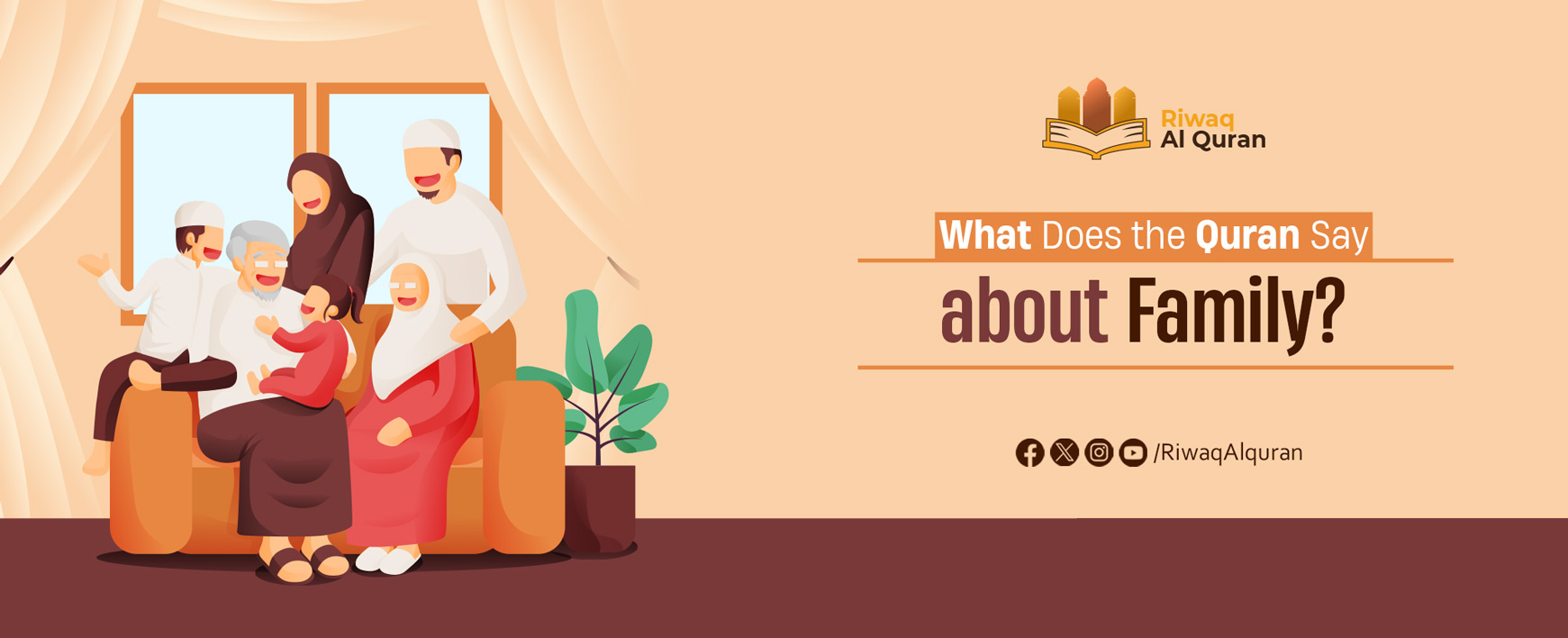What Does the Quran Say About Family? The Quran offers a profound guide on nurturing family relationships, emphasizing respect, compassion, and justice. It provides wisdom for addressing common family issues, and promoting a harmonious and loving environment.
When faced with toxic or jealous family members, the Quran encourages patience, prayer, and setting healthy boundaries, helping Muslims foster strong, resilient bonds. Discover how these timeless principles can transform your family life with Riwaq Al Quran!
The Quran highlights the importance of family bonds and encourages maintaining strong, loving relationships among family members. It underscores the value of parents, children, and extended family, emphasizing their roles and responsibilities as follows:
Table of Contents
1. Respect and Honor Parents:
One of the central themes in the Quran is the respect and honor due to parents. The Quran says:
“And We have enjoined upon man [care] for his parents. His mother carried him, [increasing her] in weakness upon weakness, and his weaning is in two years. Be grateful to Me and to your parents; to Me is the [final] destination.” (Surah Luqman, 31:14)
2. Rights and Duties of Spouses:
The Quran also provides guidance on the relationship between spouses, promoting love, mercy, and kindness. It states:
“And of His signs is that He created for you from yourselves mates that you may find tranquility in them; and He placed between you affection and mercy. Indeed in that are signs for a people who give thought.” (Surah Ar-Rum, 30:21)
3. Care for Children:
Children are considered a blessing in Islam, and their upbringing is a significant responsibility. The Quran advises parents to nurture their children with love and guidance:
“O you who have believed, protect yourselves and your families from a Fire whose fuel is people and stones…” (Surah At-Tahrim, 66:6)


Family problems are inevitable, but the Quran provides wisdom and solutions to address them, promoting harmony and understanding within the family unit.
4. Patience and Forgiveness When Dealing With Family Problems:
The Quran encourages patience and forgiveness when dealing with family conflicts. It advises maintaining a calm and composed attitude, seeking to resolve issues peacefully.
“And the retribution for an evil act is an evil one like it, but whoever pardons and makes reconciliation – his reward is [due] from Allah. Indeed, He does not like wrongdoers.” (Surah Ash-Shura, 42:40)
When conflicts arise, the Quran recommends seeking counsel and mediation from wise and impartial family members or community leaders.
“And if you fear dissension between the two, send an arbitrator from his people and an arbitrator from her people. If they both desire reconciliation, Allah will cause it between them.” (Surah An-Nisa, 4:35)
The Quran emphasizes maintaining justice and fairness in family matters, ensuring that the rights of all members are respected.
“O you who have believed, be persistently standing firm in justice, witnesses for Allah, even if it be against yourselves or parents and relatives…” (Surah An-Nisa, 4:135)
5. The Good Way To Deal with Toxic Family Members
Dealing with toxic family members can be challenging, but the Quran and Hadith offer guidance on handling such situations with wisdom and compassion.
Islam encourages setting healthy boundaries to protect oneself from harm while maintaining respect and kindness.
“Repel [evil] by that [deed] which is better; and thereupon the one whom between you and him is enmity [will become] as though he was a devoted friend.” (Surah Fussilat, 41:34)
The Quran advises seeking patience and prayer when dealing with difficult family members, trusting in Allah’s wisdom and guidance.
“O you who have believed, seek help through patience and prayer. Indeed, Allah is with the patient.” (Surah Al-Baqarah, 2:153)
It is essential to maintain one’s dignity and avoid engaging in negative behavior, even when provoked.
“And the servants of the Most Merciful are those who walk upon the earth easily, and when the ignorant address them [harshly], they say [words of] peace…” (Surah Al-Furqan, 25:63)

6. Dealing with Jealous Family Members in Islam:
Jealousy within the family can create tension and conflict, but the Quran provides guidance on managing such feelings constructively.
Islam encourages promoting goodwill and avoiding actions that may provoke jealousy.
“And do not wish for that by which Allah has made some of you exceed others. For men is a share of what they have earned, and for women is a share of what they have earned. And ask Allah of His bounty. Indeed, Allah is ever, of all things, Knowing.” (Surah An-Nisa, 4:32)
The Quran advises seeking refuge in Allah from envy and evil inclinations.
“Say, ‘I seek refuge in the Lord of the daybreak, From the evil of that which He created, And from the evil of darkness when it settles, And from the evil of the blowers in knots, And from the evil of an envier when he envies.'” (Surah Al-Falaq, 113:1-5)
Practicing gratitude and focusing on one’s blessings can help mitigate feelings of jealousy and foster a positive attitude.
“And [remember] when your Lord proclaimed, ‘If you are grateful, I will surely increase you [in favor]; but if you deny, indeed, My punishment is severe.'” (Surah Ibrahim, 14:7)
7. Maintaining Good Family Relationships
Being a better Muslim and maintaining good family relationships are interconnected and essential for a fulfilling life. Here are some tips to help you improve in both areas:
Strengthen Your Iman
To strengthen your faith, it’s essential to consistently engage in the five daily prayers and ensure they are performed on time. Reading and reflecting on the Quran daily helps deepen your understanding and connection to Allah. Additionally, making regular Dua allows you to seek Allah’s guidance and mercy, fostering a stronger spiritual bond.
Gain Knowledge
Gaining knowledge about Islam is crucial for being a better Muslim. Enroll in Online Islamic studies courses or attend lectures that delve into the teachings of Islam. Reading Islamic books written by reputable scholars can also broaden your understanding of various aspects of the religion and provide guidance on how to live a righteous life.
Practice Good Deeds
Practicing good deeds is an integral part of being a good Muslim. Giving to those in need through charity not only helps the less fortunate but also purifies your wealth. Showing kindness and compassion to everyone, regardless of their background, reflects the true spirit of Islam and fosters positive relationships.
Follow the Sunnah
Emulating the behavior and practices of Prophet Muhammad is a vital aspect of being a better Muslim. By following the Sunnah, you can incorporate the Prophet’s example into your daily life, which includes showing respect, patience, and love towards your family members. This not only enhances your personal character but also strengthens family bonds.
Cultivate Patience and Gratitude
Sabr and Shukr are essential qualities for a Muslim. Life is full of challenges and blessings, and maintaining a balance between these two attitudes can help you navigate both. When faced with difficulties, patience allows you to persevere with faith, while gratitude for your blessings keeps you grounded and content. Both qualities help in maintaining harmony within yourself and your family.
Read more about: What Does the Quran Say About Children?
Experience Riwaq Al Quran Classes
Watch real moments from our live sessions at Riwaq Al Quran and see how we bring learning to life. These clips highlight our interactive, student-focused approach designed to keep learners engaged, motivated, and actively involved in every step of their educational journey.


Why Students Love Learning with Riwaq Al Quran
Hear directly from our students about how Riwaq Al Quran Academy has transformed their connection with the Book of Allah. Their experiences reflect the dedication, care, and quality that guide every step of our teaching.
Be Part of the Riwaq Al Quran Family!
For those seeking to deepen their understanding of the Quran and its teachings on family and other aspects of life, Riwaq Al Quran offers comprehensive courses that cater to all levels of learners. Join us to embark on a journey of spiritual growth and knowledge, guided by the divine wisdom of the Quran.
We offer several courses such as:
- Online courses for kids.
- Online Quran classes for kids and adults.
- Online Arabic courses
- Online Ijazah courses
- Online Islamic Studies courses.
Conclusion
The Quran provides a profound and comprehensive guide on family relationships, addressing various aspects of family life and offering solutions to common problems. It emphasizes respect, compassion, and justice, promoting a harmonious and loving family environment.
When dealing with toxic or jealous family members, the Quran advises patience, prayer, and maintaining one’s dignity while setting healthy boundaries. By following the principles outlined in the Quran, Muslims can navigate family challenges with wisdom and grace, fostering strong and resilient family bonds.


































